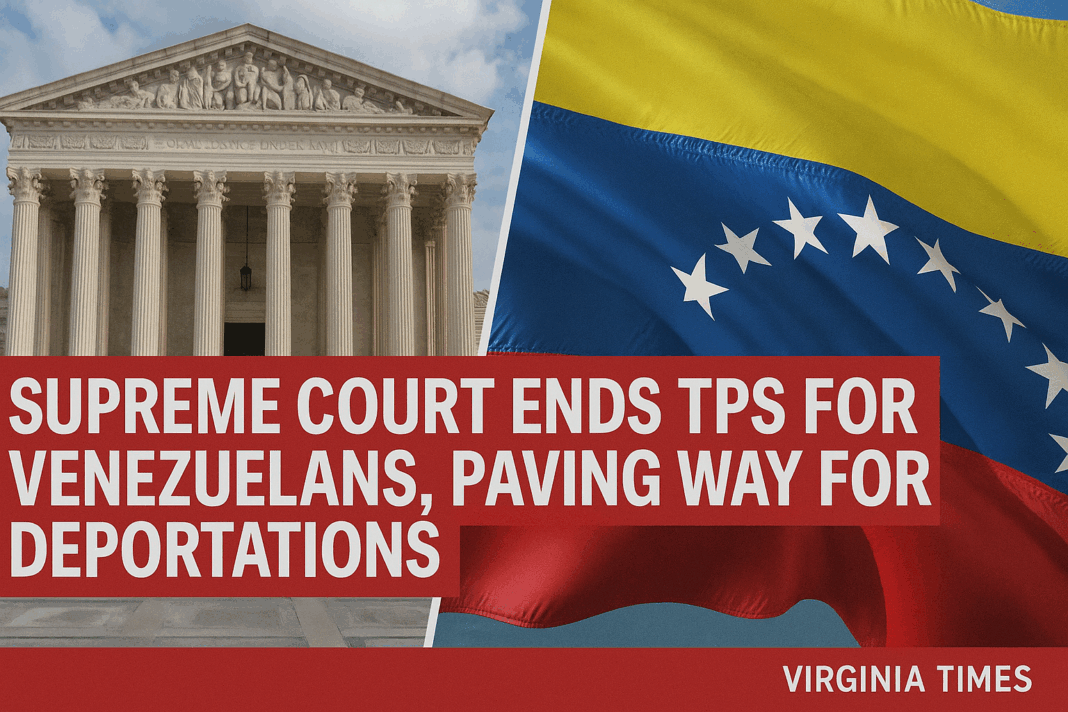- SCOTUS clears Trump administration to end TPS protections for 348,000+ Venezuelans
- Only Justice Ketanji Brown Jackson dissented; no detailed reasoning provided
- Case heads to the Ninth Circuit amid allegations of racial and political bias
- Advocates warn of economic and humanitarian crisis if deportations proceed
WASHINGTON, D.C. — The U.S. Supreme Court on Monday, May 19, 2025, allowed the Trump administration to proceed with terminating Temporary Protected Status (TPS) for more than 348,000 Venezuelan immigrants — a decision that significantly alters the landscape of U.S. immigration policy and raises fresh international concerns.
According to Reuters, the Court granted the Justice Department’s emergency request to lift an injunction issued by U.S. District Judge Edward Chen, which had blocked Homeland Security Secretary Kristi Noem’s effort to terminate TPS. The program, established in 1990, offers protection from deportation and work permits to individuals from countries plagued by war, environmental disasters, or political instability.
— Ahilan Arulanantham, UCLA Center for Immigration Law and Policy
Roughly 348,202 Venezuelans who had been granted TPS under former President Joe Biden’s 2023 extension are affected. The Supreme Court’s unsigned order did not include a rationale, sparking criticism from legal scholars and immigration advocates. CNN reports that Justice Ketanji Brown Jackson was the lone dissenter to publicly register her opposition.
The Court’s decision clears the path for potential deportations but permits future legal challenges over the cancellation of work permits and TPS-related documentation set to expire in October 2026.
According to The New York Times, the matter now shifts to the 9th U.S. Circuit Court of Appeals, where plaintiffs argue that the Trump administration’s revocation is rooted in racial and political animus — a potential violation of the Administrative Procedure Act.
Background: TPS and Venezuela’s Humanitarian Crisis
The TPS designation for Venezuela stems from the country’s economic collapse and political repression under President Nicolás Maduro. The Biden administration extended TPS in 2023, citing “extraordinary conditions,” including crime, terrorism risks, and arbitrary detentions, according to State Department assessments.
Judge Edward Chen had previously blocked the termination, stating that TPS recipients are statistically less likely to commit crimes and more likely to possess bachelor’s degrees than the general U.S. population. Chen’s ruling emphasized that returning Venezuelans to current conditions posed a significant human rights concern.
Legal and Political Ramifications
Immigrant rights groups are preparing for continued legal battles. The National TPS Alliance condemned the Supreme Court’s ruling and vowed to escalate the case through appeals and advocacy. Legal experts warn that the decision could erode due process protections and set a precedent for broader executive authority in immigration matters.
Beyond the domestic implications, the ruling has geopolitical undertones. Reuters reports that U.S. allies — including the United Kingdom, France, and Canada — expressed concern over America’s hardening immigration stance and its potential impact on broader international diplomacy, especially as tensions flare in the Middle East. While the TPS ruling was not directly linked, diplomatic observers note the ripple effects of U.S. domestic policies abroad.
What’s Next?
The Ninth Circuit will now evaluate the legality of the TPS termination. The plaintiffs argue that Secretary Noem failed to follow procedural safeguards and exhibited discriminatory intent. Legal scholars say the case could become a landmark test of the Administrative Procedure Act in immigration law.
For now, TPS recipients remain in legal limbo. Without swift judicial or legislative action, tens of thousands of Venezuelans could face deportation to a country the U.S. government still considers unsafe.
(with inputs from Reuters, CNN, and The New York Times)
A global media for the latest news, entertainment, music fashion, and more.














